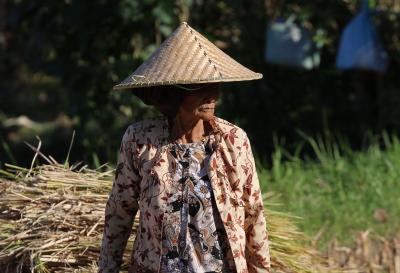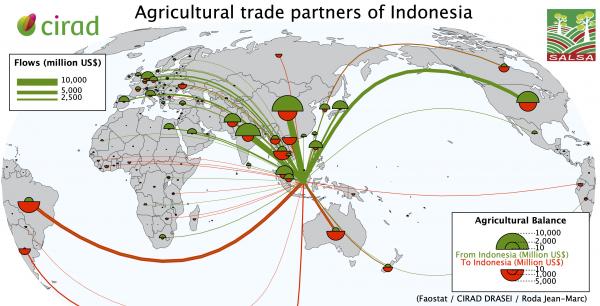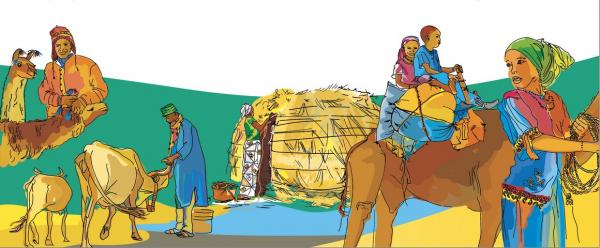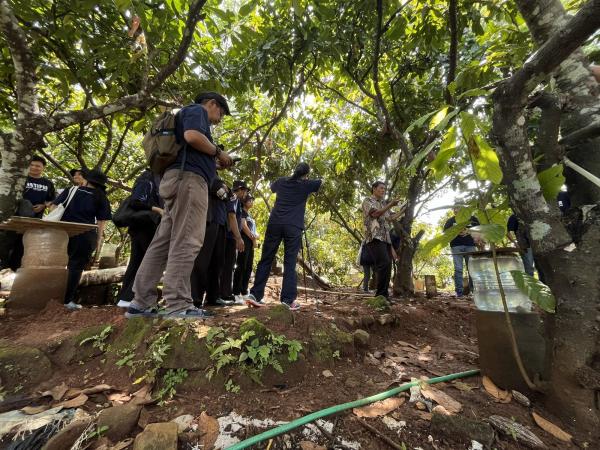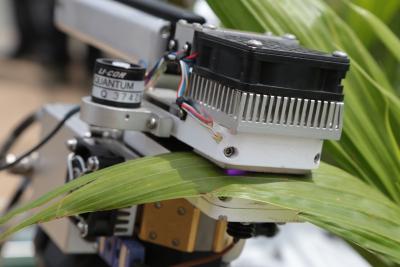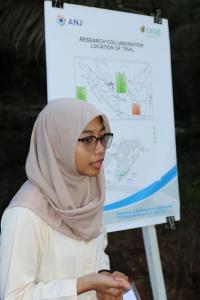- Home
- Worldwide
- Our regional offices
- Southeast Asian Islands

Southeast Asian Islands
Reconciling agricultural development and sustainable tropical forests
In the Southeast Asian islands, more than anywhere else, the fate of tropical forests is strongly dependent on agricultural policy. Agricultural development in the region must be analysed in terms not just of its positive contribution to food security, but of its impact on those forests.
Research is therefore aiming to reconcile food security and the preservation of natural areas. CIRAD's operations and those of its partners centre on ecological intensification and the switch to sustainable, zero-deforestation agricultural management techniques.
Agricultural teaching and training must now allow for the commitments made by governments and private operators in terms of climate change management and forest preservation.
CIRAD's Regional Office for the Southeast Asian Islands covers a vast maritime region of more than 17 000 islands with an area of 2554 million km2 and a population of 420 million. CIRAD has around ten researchers on oversea postings assigned to four countries in the region: Malaysia, the Philippines, East Timor, and above all Indonesia. It also conducts missions to Singapore and Brunei.
Strengthening regional cooperation with universities and research centres
CIRAD's Regional Office is in Jakarta, Indonesia. It shares its offices with the IRD representative in Indonesia.
CIRAD's researchers work within university research teams (Universiti Putra Malaisia), or are hosted by CGIAR international centres (CIFOR in Indonesia, IRRI in the Philippines) or by private research centres (PT SMART in Indonesia). The training programmes in which it is involved give its work a regional dimension, and are paving the way for future partnerships.
Emblematic projects and platforms in partnership for research and training
The dots show the countries in which CIRAD and its partners work. They do not show specific sites.
Key figures
- 10 researchers on overseas postings
- 10 PhD and Masters students supervised per year
- 100 missions per year
- 1 platform in partnership
Main research fields
- Genomics, genetics and crop protection
- Natural resource management
- Sustainable tree crop production systems
- Support for family farming
- Public policy support
Platform in partnership

Emerging diseases in Southeast Asia
How can we manage the emerging health risks at the interface between animals, humans and their environments?
A word from our partners...
Le CIFOR a une longue collaboration avec le Cirad (débutée en 1997 avec les questions d’exploitation à impact réduit). Cette collaboration est d’une grande valeur pour le CIFOR, car nous sommes intrinsèquement complémentaires dans nos approches et nos capacités. La présence depuis plusieurs années de chercheurs du Cirad sur les sites du CIFOR et de chercheurs CIFOR sur les sites Cirad a permis d’enrichir fortement nos deux institutions. Un bel exemple de collaboration internationale en recherche pour le développement, où le tout est bien plus que la somme des parts.
Depuis plus de 20 ans, HUTAN s’efforce de trouver des solutions pour que les orang-outangs, les éléphants et autres espèces animales survivent dans le bassin de la Kinabatangan, une région unique et importante pour la biodiversité de Bornéo. Nos recherches montrent que pour éviter la disparition de ces espèces emblématiques il est urgent d’identifier des modes de gestion rationnelle des zones non protégées, afin de permettre la survie et le maintien de populations saines et viables. Comprendre comment certaines espèces s’adaptent et survivent dans des paysages agricoles dominés par des plantations de palmiers à huile est une clef pour réussir. Dans le cadre du projet TRAILS, notre collaboration avec le Cirad nous permet d’analyser et de mieux comprendre comment les paysages agro-forestiers dominés par des plantations de palmiers à huile pourraient s’intégrer dans des stratégies de conservation d’espèces menacées.
Some key projects
The Southeast Asian islands offer a unique range of agroecological situations and island systems with substantial biodiversity, providing a particularly attractive opportunity for building joint projects of international importance, capable of addressing novel, relevant scientific issues. The projects under way, in Indonesia and in Malaysia, concern fundamental issues around sustainable development raised by civil society in Europe and in Asia (urbanization, the rural exodus, preservation of fragile ecosystems).

Training in sustainability for plantation managers
The aim of the TALENT project (Training on landscape management) is to raise awareness and to provide training in sustainability for managers of plantations in Southeast Asia, thanks to a revised training system.
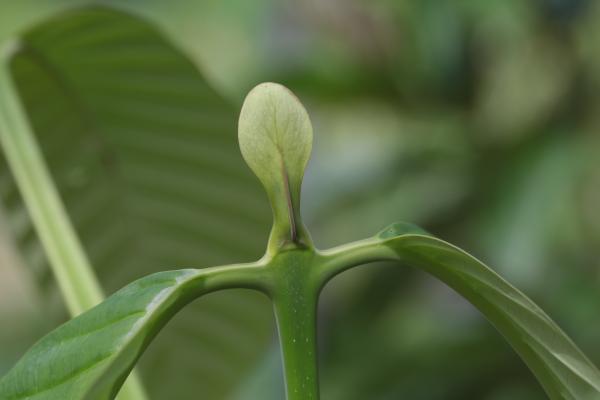
Limiting tropical deforestation linked to perennial crop plantations in Southeast Asia
The TRAILS project is an action research project to support the restoration of ecosystems degraded by the expansion of oil palm monoculture in Malaysia. Its goal is to limit tropical deforestation and the impacts of perennial crop plantations on land cover changes, biodiversity and climate resilience by promoting agroecological approaches.
Installing sustainable agroforestry in East Timor: the Ai'ba Futuru project
Teaching and training
The vast majority of CIRAD researchers in the region are involved in training students and French and local researchers.
Rejuvenating training of plantation managers
The Agence française de développement (AFD) and CIRAD have committed to promote sustainable agricultural plantation and planted forest management in four countries belonging to the Association of the South-East Asia Nations (ASEAN). TheTALENT (TrAining on LandscapE maNagemenT) programme has 1.2 million euros of funding from the Fonds pour l’expertise et les échanges d’expériences (FEXTE).
Over the coming five years, CIRAD will be supporting skill building in those four ASEAN countries (Indonesia, Malaysia, Thailand and Vietnam). This will mean consolidating the existing training structures to train new generations of plantation managers, teaching them how to boost plantation productivity and sustainability.
After an initial nine-month feasibility study, the project will support the existing structures providing initial training for Masters students and further training for managers already working (for large plantations, smallholder cooperatives and banks providing agricultural funding). Training courses will centre on agroecology, environmental and social management, and how to take account of climate change and biodiversity. In addition to its operations for students, the project will organize regional workshops to raise awareness and allow participants to share their experiences and good practice.
Scientific publications
See all publications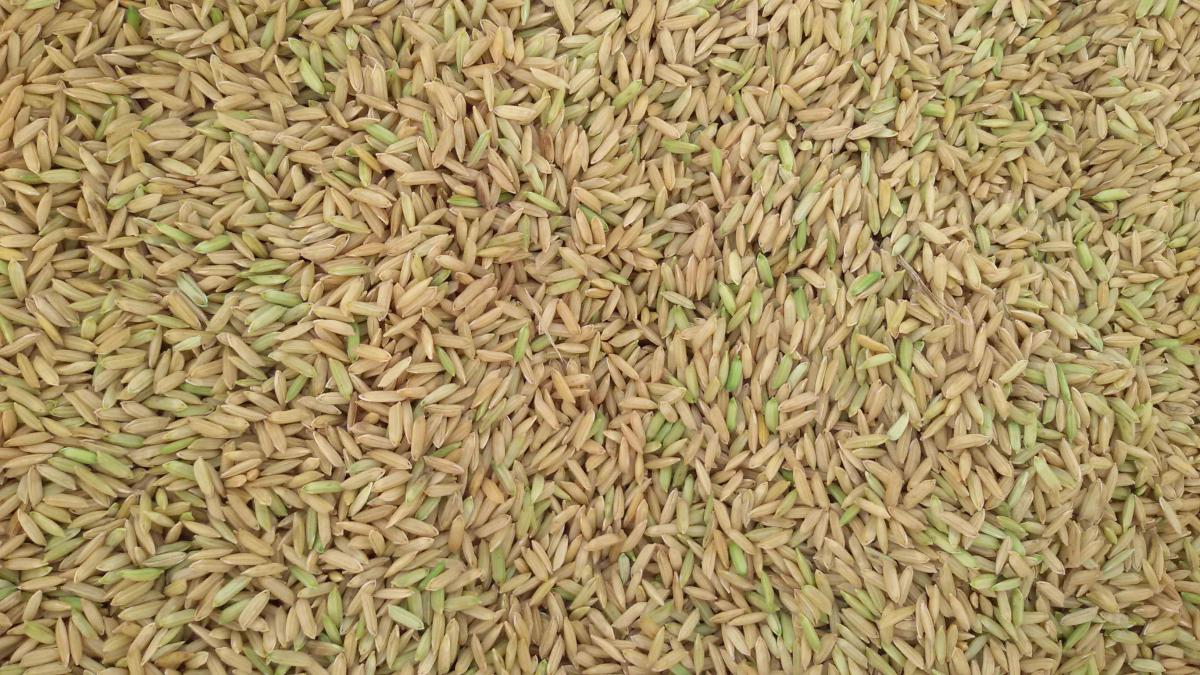
Contact
CIRAD Regional Office for the Southeast Asian Islands -
Jean-Marc Roda
Graha Kapital 1 - Jl. Kemang Raya no. 4 -
Jakarta 12730 - Indonesia
Tel.: +62 21 71 98 641/642
Fax: +62 21 71 79 46 52

























